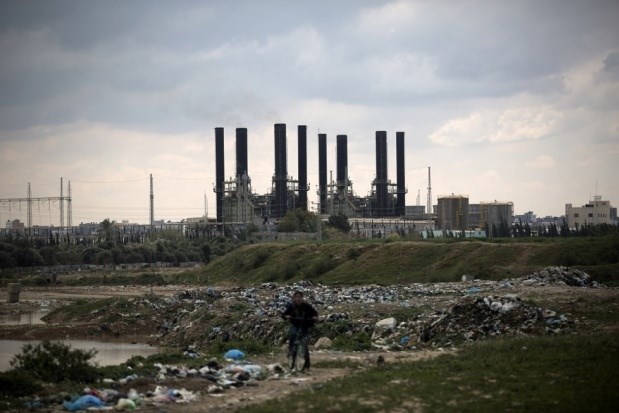Israel started to reduce electricity supplies to the besieged Gaza Strip on Monday, despite being urged by humanitarian organizations not to implement the decision, which came at the request of the Palestinian Authority (PA).
Gaza’s electricity company, the Gaza Electricity Distribution Corporation, said in a statement Monday that the Israeli grids supplying the Gaza Strip reduced their output from 120 to 112 megawatts. The statement explained that the reduction affected two grids — one known as the Baghdad Line that feeds the Gaza City district and Grid 11 that feeds Khan Yunis in southern Gaza — which had previously produced a combined 24 megawatts of power, and were now producing just 16 megawatts. Electricity company spokesman Muhammad Thabet said the reduction meant power would be provided for only two to three hours a day.
Israel announced the decision to cut supplies last week, after Palestinian President Mahmoud Abbas said the occupied West Bank-based PA would no longer pay the full amount of the monthly electricity bill, as both Israel and the PA have accused Hamas of collecting millions of shekels in taxes from Gazans every month without transferring the money to the PA.
Hamas spokesman Sami Abu Zuhri said in a statement later on Monday that “the Israeli occupation is primarily responsible for the consequences of the electricity reduction, because Israel collects taxes from Palestinians at Gaza’s crossings that are more than enough to cover Gaza’s of electricity needs.”
Another Hamas spokesman, Fawzi Barhoum, was also quoted in an official Hamas statement as saying that both Israel and Abbas were responsible for the “disastrous repercussions of these electricity reductions and of blocking fuel supplies to reach the Gaza Strip’s power plant.”
Gaza’s sole power plant shut down in April, as Gaza’s electricity officials said they could not afford a PA-imposed tax on diesel fuel that doubled the price of operating the plant. As a result, Gazans went from eight hours of electricity a day down to three or four.
Barhoum said the Israeli and PA measures would “accelerate the deterioration of the situation in the Gaza Strip, because they affect every aspect of daily life.” He urged Palestinian factions to resist the Israeli and PA actions and to prepare for further projects that aim to “liquidate the Palestinian cause.”
Gaza, which marked its 10th year under Israeli blockade last week, has struggled for years with power shortages due to limited fuel access and degraded infrastructure. A group of 16 civil society organizations urged Israeli authorities on Wednesday to reconsider limiting electricity output to Gaza, slamming the decision as “unrelated to concrete security needs” and “political in nature,” therefore in violation of international law.
“Israel cannot claim to be only a service provider, responding neutrally to a client’s request. Given its extensive control over life in the Strip, Israel is responsible for enabling normal life for its residents, as an occupying force in the Strip,” the groups said.
The power reduction is expected to have immediately and disastrous effects on the medical sector in particular, which is also impacted by separate PA budget cuts, putting hundreds of patients’ lives at risk.
While UN Humanitarian Coordinator in the occupied Palestinian territory Robert Piper characterized the ever-worsening crisis in Gaza as “an internal Palestinian dispute” on Wednesday, rights groups have placed the bulk of the blame on the Israeli siege.
Israeli NGO B’Tselem blamed the blockade for putting Gaza “in the throes of a humanitarian disaster,” adding that Israel was “consigning (Gaza’s) residents to living in abject poverty under practically inhuman conditions unparalleled in the modern world.”
“This is not some sort of natural disaster,” B’Tselem added. “Had that been the case, Israel would have likely sent in a humanitarian aid mission. Instead, the reality in Gaza is the result of Israel’s handiwork, achieved by its decade-long implementation of a brutal policy.”
[Source: Ma’an News]





 WhatsApp us
WhatsApp us 

